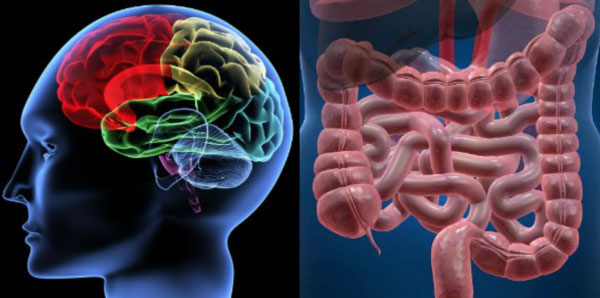If you were told that your anxiety may be coming from the health of the bacteria in your gut would you believe it? Evidence is mounting every day which proves just how important gut health is for our mental health, and more importantly: Why.

Our gut does more than help us digest food; the bacteria in our intestines have been implicated in everything from our mental health and sleep, to weight gain and cravings for certain foods. Let’s examine how our gut works as a second brain, and just how crucial gut microbes are in affecting our moods, stress levels, feelings of anxiety and our sleep.
What is gut microbiota?
The gut microbiota is the community of bugs, including bacteria, that live in our intestine. When you’re healthy, bacteria are kept safely inside your gut. It has been called the body’s “forgotten organ” because of the important role it plays beyond digestion and metabolism. For the most part, the bacteria and your gut live in harmony.
What evidence is there that your gut microbiota affects your brain?
Well, in a nutshell, the gut has a two-way relationship with the central nervous system, and this is referred to as the “gut-brain axis.” This means the gut can send information to the brain, as well as receive information from the brain. When things go wrong, the normal channels of communication from your gut are being hijacked by ‘bad’ bacteria.
A recent study found that the addition of a “good” strain of the bacteria lactobacillus (which is also found in yoghurt) to the gut of mice reduced their anxiety levels. The effect was blocked after cutting the vagus nerve – the main connection between brain and gut. This suggests the gut-brain axis is being used by bacteria to affect the brain.
Furthermore, in mouse studies, changes to the gut bacteria from antibiotics, probiotics (live bacteria) or specific breeding techniques are associated with anxious and depressive behaviours. These behaviours can be “transferred” from one mouse to another after a faecal microbiota transplant.
Even more intriguingly, in a study this year, gut microbiota samples from people with major depression were used to colonise bacteria-free rats. These rats went on to show behavioural changes related to depression.
It works the other way, too: In rat pups, exposure to a stressor (being separated from their mums) changed their gut microbiota, and therefore their stress response and their behaviour. Probiotics containing “good” strains of bacteria reduced their stress behaviours.
Lastly, two human studies looked at people with major depression and found that bacteria in their faeces differed from healthy volunteers.
Is your diet fuelling your anxiety?
Research is constantly mounting to support that our dietary choices really matter. Consuming a healthy diet not only offers our bodies the essential nutrients that we need to regulate our nervous system: Your dietary choices also have an impact upon the types of microbes that reside in your digestive tract.
Recent studies have found that your gut microbiome influences our mood, sleep and how we experience stress. The communication between the brain and the gut has long been established but we now also know that our dietary choices also can modulate the balance of bacteria in the digestive tract. The balance of bacteria can either support and nurture our nervous system or agitate it. When we are consuming the right amounts and types of dietary fibre we feed up the good bacteria, such as lactobacillus. Lactobacillus has been shown to have a calming effect on the body. Whereas other types of bacteria can produce acidic by products and toxins that can create inflammation in the body and cause affects on the brain via the gut-brain axis.
How Do I Get a Healthy Microbiome Balance?
At Paddington Clinic we can help you make the changes to your diet to ensure that you are receiving all the nutrients and adequate fibre that is required to nourish your nervous system but also ensure that your microbiome has enough good bacteria to help you manage your mood, sleep and stress levels effectively. For example, probiotics (live bacteria) treatments in mice have been shown to reduce cortisol, an important stress hormone, and decrease anxious and depressive behaviours.
Our naturopaths can also order tests to assess the levels of both good and harmful bacteria. Therefore, we can offer specific and very customised treatments to ensure you have a healthy microbiome balance.
Please contact us for any further information or to make a booking with one of our naturopaths.

